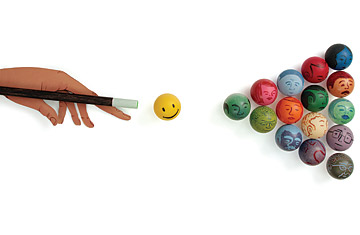
The next time you get the flu, there will almost certainly be someone you can blame for your pain. There's the inconsiderate co-worker who decided to drag himself to the office and spent the day sniffling, sneezing and shivering in the cubicle next to yours. Or your child's best friend, the one who showed up for a playdate with a runny nose and a short supply of tissues. Then there's the guy at the gym who spent more time sneezing than sweating on the treadmill before you used it.
You're right to pass the blame. Pathogens like the influenza virus pass like a holiday fruitcake from person to person, but you probably don't think much past the one who gave it directly to you. An infectious-disease expert, on the other hand, would not be satisfied to stop there. What about the person who passed the virus on to your colleague, the one before him and others earlier still? Contagious diseases operate like a giant infectious network, spreading like the latest YouTube clip among friends of friends online. We're social animals; we share. (See the Year in Health, from A to Z.)
So public-health experts are beginning to wonder whether certain health-related behaviors are just as contagious as microbes. If you're struggling with your weight, did you in effect catch a case of fat by learning poor eating and exercise habits from a friend or family member who was similarly infected by someone else? If you smoke, do you light up because you were behaviorally contaminated by smokers who convinced you of the coolness of the habit? Even more important, if such unhealthy behaviors are contagious, are healthy ones--like quitting smoking or exercising--equally so? And what if not only behaviors but also moods and mental states work the same way? Can you catch a case of happy?
Increasingly, the answer seems to be yes. That's the intriguing conclusion from a body of work by Harvard social scientist Dr. Nicholas Christakis and his political-science colleague James Fowler at the University of California at San Diego. The pair created a sensation with their announcement earlier this month of a 20-year study showing that emotions can pass among a network of people up to three degrees of separation away, so your joy may, to a larger extent than you realize, be determined by how cheerful your friends' friends' friends are, even if some of the people in this chain are total strangers to you.
If that's so, it creates a whole new paradigm for the way people get sick and, more important, how to get them healthy. It may mean that an individual's well-being is the product not just of his behaviors and emotions but more of the way they feed into a larger social network. Think of it as health Facebook-style. "We have a collective identity as a population that transcends individual identity," says Christakis. "This superorganism has an anatomy, physiology, structure and function that we are trying to understand."
